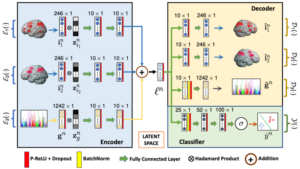Neuropsychiatric disorders, such as autism and schizophrenia, have two complementary viewpoints. On one hand, they are associated with behavioral and cognitive dysfunction, which manifest through altered brain activity. On the other hand, they are highly heritable, which suggests a strong genetic underpinning. Non-invasive techniques like fMRI and Single Neucleotide Polymorphism (SNP) are common data modalities to capture the brain activity and genetic variations, respectively. However, integrating them in a single framework is hard due to their inherent complexity, high data dimensionality, and our limited knowledge about the underlying relationships.
 Imaging-genetics is an emerging field that attempts to link neuroimaging and genetic biomarkers. However, most methods focus on a restricted set of biomarkers, which provides an incomplete picture of the impacted processes, and they do not account for the observed clinical phenotype. We are developing novel frameworks that integrate multimodal neuroimaging, genetic, and phenotypic data for improved biomarker discovery and subject-level prediction. Our strategy is to project the data modalities into a shared latent space that is simultaneously predictive of patient-level clinical phenotype. We have explored both model-based projections like dictionary learning and end-to-end models via biologically-inspired deep neural networks. In the latter case, our unique formulation easily accommodates missing data modalities, thus maximally using the available information.
Imaging-genetics is an emerging field that attempts to link neuroimaging and genetic biomarkers. However, most methods focus on a restricted set of biomarkers, which provides an incomplete picture of the impacted processes, and they do not account for the observed clinical phenotype. We are developing novel frameworks that integrate multimodal neuroimaging, genetic, and phenotypic data for improved biomarker discovery and subject-level prediction. Our strategy is to project the data modalities into a shared latent space that is simultaneously predictive of patient-level clinical phenotype. We have explored both model-based projections like dictionary learning and end-to-end models via biologically-inspired deep neural networks. In the latter case, our unique formulation easily accommodates missing data modalities, thus maximally using the available information.
Selected Publications
- S. Ghosal, Q. Chen, G. Pergola, A.L. Goldman, W. Ulrich, D.R. Weinberger, A. Venkataraman. A Biologically Interpretable Graph Convolutional Network to Link Genetic Risk Propagations and Imaging Biomarkers of Disease. To Appear in International Conference on Learning Representations (ICLR), 2022.
[Acceptance Rate ≈ 30%] - S. Ghosal, Q. Chen, G. Pergola, A.L. Goldman, W. Ulrich, K.F. Berman, A. Rampino, G. Blasi, L. Fazio, A. Bertolino, D.R. Weinberger, V.S. Mattay, A. Venkataraman. A Generative Discriminative Framework that Integrates Imaging, Genetic, and Diagnosis into Coupled Low Dimensional Space. NeuroImage: 238:118200, 2021.
- S. Ghosal, Q. Chen, G. Pergola, A.L. Goldman, W. Ulrich, K.F. Berman, A. Rampino, G. Blasi, L. Fazio, A. Bertolino, D.R. Weinberger, V.S. Mattay, A. Venkataraman. G-MIND: An End-to-End Multimodal Imaging-Genetics Framework for Biomarker Identification and Disease Classification. In Proc. SPIE, vol.11596, 2021. Selected an Oral Presentation (<15% of Papers) – Best Paper Award
- S. Ghosal, Q. Chen, A.L. Goldman, W. Ulrich, K.F. Berman, D.R. Weinberger, V.S. Mattay, A. Venkataraman. Bridging Imaging, Genetics, and Diagnosis in a Coupled Low-Dimensional Framework. In Proc. MICCAI: International Conference on Medical Image Computing and Computer Assisted Intervention, LNCS 11767:647-655, 2019. [Acceptance Rate ≈ 30%]
Selected for Early Acceptance (Top 18% of Submissions)
Funding
- NSF CRCNS 1822575 (PI: Venkataraman)
Discovering Network Structure in the Space of Group-Level Functional Differences
Project Dates: 10/01/18 – 09/30/22
Total Funding Amount: $874,048

